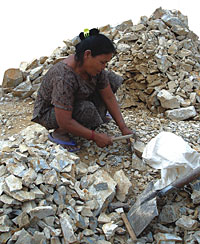 ONG KAI LING |
But there is no sign any of this is worrying our political party leadership. They don't seem to care that the economy is in shambles, the budget hasn't been passed, highway arteries are blocked, and remote area airfields are being shut down by militant locals.
If the parties don't sort out their political quarrels, they will sink Nepal. Here's the lowdown on the economy.
Although most Nepalis work in agriculture, it contributes far less to GDP than the service sector and not much more than industry. Poor infrastructure and persistent transport disruptions have hurt productivity further, and the ensuing rural-urban migration has fed a growing law and order problem. Along with labour unrest and power shortages, this explains Nepal's industrial stagnation in large part. Politicians don't help by encouraging aggressive unionism, as the public offering of the Biratngar Jute Mill recently attests to, and refusing to get tough on road blockaders.
Services, on the other hand, will stay strong so long as remittances and tourism, which have weathered the worst of the global recession, revive revenue and the housing market doesn't crash. Yet benefits haven't reached the countryside. Financial services, for example, grew by double-digit figures last year but mainly oiled Kathmandu's housing boom.
The government can't mandate big rural loans because the risks remain high and the financial infrastructure is straining under a glut of banks. If we're not careful, this bubble could burst with disastrous results. The government has the means to fix these problems since revenue collection is up, but it lacks the political will and imagination to spend the windfall meaningfully.
To stave off economic disaster, the parties must agree to a common program to immediately restore local bodies, renounce irresponsible unions and clamp down on transport interruptions. They must also agree to shore up agricultural productivity by extending rural finance and extending the road network.
It goes without saying that attending to the economy today will ensure that the politics will not be unstable tomorrow. A healthy farming sector will improve law and order, and building infrastructure creates jobs and controls runaway urbanisation.
The good news is that our problems are manageable. The bad news is that unless we move beyond politics to attend to the economy, whoever comes to power in this country will wish they hadn't because of the social anarchy resulting from a stagnant economy.


